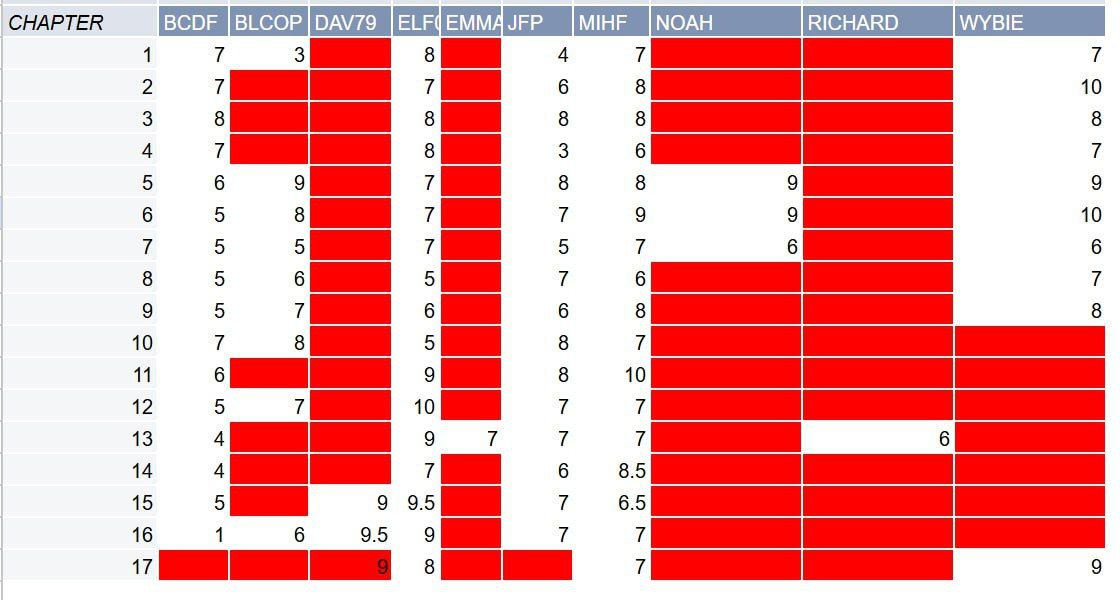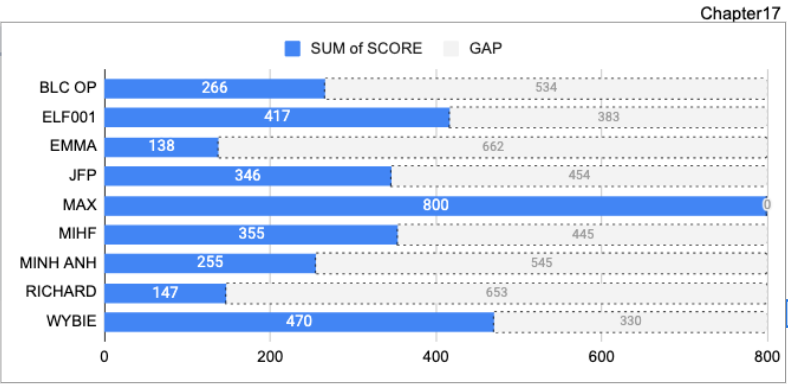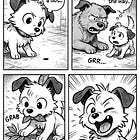Chapter 17 : Experimenting with the Moonlight
A gentle tale of longing, wonder, and freedom—where a child’s dream to touch the moon becomes a journey of joy, discovery, and quiet transformation.
INTRODUCTION
In this quarter’s Daily Discovery series, the Insight Miner module empowers participants to think like explorers—curious, grounded, and ready to learn through action. This month’s focus is on the Art of Experimenting: making hypotheses, observing with intent, tracking time, and adapting along the way. The goal is not to prove, but to discover. Each trait—from structured thinking to staying unbiased—is a mindset muscle we’re training. Through micro-challenges and daily reflections, participants will learn to extract insight from action, turning small tests into powerful self-discoveries. Insight isn’t given—it’s mined through thoughtful experimentation.
STORY BY WYBIE | CHALLENGES BY WYBIE
A. THE PASSAGE
Wybie’s Story –
I lay in the middle of a green meadow wrapped in a gentle morning mist. I lay in the calm and peaceful stillness of the countryside. Here... there was no noise, no rush...
Only me... making friends with the grass, with the flowers, with the endless sky.
I looked up at the moon. The moon didn’t need to respond. The full moon floated gently through the fading mist.
My eyes lit up with wonder. Then I laughed. I laughed a lot. My joy rose freely, dancing in the wind with the clouds. The moon’s silhouette shimmered softly in the night. I quickly stretched out my small arms... as if I could catch it and twirl.
I wished to fly up to the bright stars... and bathe in the ivory moonlight...
I wanted to, I wanted to!
Day after day, night after night, I lay dreaming on the vast grassland.
I did not yet know exactly who I was, nor where I belonged. I only knew... I had always carried a wish to play with the moon... to explore lands beyond the grasslands I had only imagined. And every time I smiled, the moon seemed to shine a little brighter...
Late. The moon rises. I look up at the moon. The moon listens patiently...
I long to play with the moon, and I begin to understand—I am never truly trapped. I don’t know since when, but the hope to live freely has grown stronger. The quiet wish I held close has become a light that gently mends the heart I once doubted.
My heart glows. My hands press softly on the land I have always cherished. My fingers dance through the blades of grass I once whispered to, now filled with laughter and dreams.
Tonight. The green grassland glows with soft light and quiet magic.
And still, I want to see the moon drifting with the breeze. To follow it beyond the hills. To grow with it, to laugh in its presence. The moon doesn’t turn away. It stays. It stays and smiles back.
Then, I suddenly woke up. Years passed, and I never had to lie alone on the grass again.
When the morning sun bloomed, the moon lingered behind, watching me sing with the grass and play beneath the trees. At night, the moonlight shone gently through the sky, reminding me of every moment I had once imagined.
My body suddenly became light... then rose with the wind to explore everywhere. I soared into the endless sky. I stretched my arms again... and this time, I wrapped them around the moon with joy. It had been a long time... since I had truly lived.
And then, I became free...
No walls. No fear. Just me... with the sky... with the moon... traveling across the world, smiling at every star.
Some thoughts that hit us
1. Can nature be your friend?
2. What does the moon feel like when it watches you?
3. Where would you go if you could fly like the wind?
JOIN US THIS WEEK ON MAY 10 @ THE EXPO and let’s discuss your academic notes on Experimenting from the INSIGHT MINER module of the DAILY DISCOVERY SERIES. ZOOM ID : 769 712 5558 (click ZOOM for the link or use the ZOOM ID)
PASS CODE : MEET
8:30 PM - 9:30 PM SINGAPORE TIME
7:30 PM - 8:30 PM VIETNAMESE TIME
6:00 PM - 7:00 PM INDIAN STANDARD TIME
4:30 PM - 5:30 PM OMAN TIME
The agenda this week
Guest Speaker
score board - Self reflection for Wybie and Mihf : the quality of the program is determined by the filling up of the document and self reflection and responses to feedback already provided.
Lin91 to speak with the parents of Emma / Richard and Ming Anh to provide feedback on substack.
challenges for the week
practical use of school knowledge.
New chapter 18 - a New module and Topic awaits : The INSIGHT MINER - connecting the dots
B. THE CHALLENGE - Let’s Experiment
In Wybie’s challenge, each of the three tasks invites participants to explore through trial, reflection, and adaptation. Though the formats vary, they all share one goal: to train the mind to test, observe, and learn—to go beyond simply finding answers and instead discover patterns, gaps, and meaning.
Why do we run these kinds of experiments?
Because true understanding doesn’t come from absorbing facts—it comes from playing with ideas, adjusting our approach, and noticing what changes when we do. Each experiment challenges how we think, how we respond, and how we refine our judgments.
Whether students are navigating a history problem, decoding a science puzzle, or tackling a group project, each experiment helps them move from copying to questioning, from repeating to redesigning.
Through Wybie’s challenges, we don’t just test knowledge—we explore how we think. We begin to recognize what draws our attention, how we interpret what we find, and what we do when results don’t match expectations. Every trial is a mirror, reflecting not just what works, but how we grow. And in the process, we build not only sharper minds—but flexible, thoughtful, and courageous ones prepared for anything beyond the classroom.
Here are the traits with their corresponding explanations based on the given experimental-related concepts:
Hypothesis – Make a clear assumption to test.
Observation – Watch closely and note what happens.
Time Tracking – Track how long and when you run the test.
No Cling Onto Something – Stay open; don’t get attached to being right.
Consider Various Impacting Factors – Think about all things that might affect results.
Documentation – Write down what you did and what you saw.
Experiment to See, Not to Prove – Focus on learning, not proving.
Structural Thinking – Organize the experiment clearly and logically.
Adaptability – Be ready to adjust based on what you learn.s in these traits, please let us know so we can review and improve them. When reaching out, kindly reference the specific chapter for clarity.
In the story above “Experimenting with the Moonlight,” the protagonist experimented not with tools or formulas—but with their own feelings, thoughts, and dreams. Here's how they embodied each aspect of the Insight Miner approach:
Hypothesis:
They believed that connection with the moon or escaping the meadow would bring peace or purpose.Observation:
They watched the moon’s responses, noticed how their emotions changed over time, and paid attention to the rhythm of solitude.Time Tracking:
The narrative unfolded over days, nights, and years, revealing how long-term emotional patterns shaped their understanding of self.Adaptation:
As they grew through longing, despair, and awakening, they shifted their perspective—from being trapped, to feeling free and connected.Structured Thinking:
Their inner journey was not chaotic—it followed an emotional arc: curiosity → yearning → breaking point → breakthrough → transformation.Staying Unbiased:
Even when the moon didn’t respond or when dreams felt unreachable, they kept exploring without forcing meaning—until meaning naturally emerged.Documentation (metaphorically):
The entire story is their record—a poetic “log” of trials, feelings, and realizations.Experiment to Discover, Not Prove:
They didn’t try to prove their importance or test the moon. They let experience reveal what was true for them.
C. Play The Game With Us
By MIHF
Click the image to play our pirate invasion game. Take a screenshot and load your score on the Qboard. This game brings experimentation through different angles of shots.
C. SESSIONS SUMMARY
The Learning Space: A Story of Experimentation
10 May 2025 | Written by Wybie
INDEX
1. RACI performance
2. Sessions Overview
3. Evaluation
4. Wrapping Up
1. RACI performance
Wybie - has regained his momentum. He needs to build up some more variety into the program - but otherwise was on the right track. MIHF demonstrated gaps in building up the quality of the session. SAHN will need to dive in to provide support periodically.
2. Sessions Overview
It began like any other Saturday, with the soft buzz of familiar names lighting up the screen and new ones entering with quiet curiosity. As I opened the session with a greeting, the group’s energy began to settle—half excited, half reflective. A scoreboard update marked our progress, a little ritual that reminded us we were all growing, one challenge at a time.
Then came the first ripple of change: we welcomed Victor and Winnie, two new members stepping into our circle for the first time. The group responded with warmth and a few emojis—our version of applause. Their arrival marked not just a new chapter for them, but a renewal of our collective spirit. With introductions done, I shifted the focus to the theme of the week: Experimenting.
Mr. T took over, his voice steady and thoughtful. "Experimentation," he said, "is not just something you do in a lab. It's a mindset." He reminded us how naturally this mindset comes to children—how they test, try, and tumble without fear. But somewhere along the path to adulthood, many of us lose that spark. Fear of failure. The craving for certainty. The loss of safe spaces to try, and to fail.
To help us reconnect with that inner child, SAHN led a brief but memorable mindfulness practice. “Smell the flower, blow the petals,” he guided. We breathed in deeply, imagining the scent of something soft and familiar, then exhaled gently, as if blowing petals into the wind. The group fell into silence—not awkward, but peaceful. It was a small act of stillness before we dove into the unknown.
Then the stories began.
Mr. T returned with reflections that grounded our theme in history and heart. He reminded us that real experimentation is guided by purpose and discipline, not chaos. He spoke of the Wright brothers, whose daring experiments led to flight—but only after many failed attempts, some fatal. He shared Thomas Edison’s relentless commitment to structure and routine, experimenting for eight years before the light bulb emerged from the darkness.
And then, more personally, he told us about his family’s decision to move from Germany to Singapore—a life-sized experiment. It was painful at times, especially for his young son, who resisted the change. But slowly, with time, his son adapted. Today, that same boy studies abroad, braver and stronger for the journey. "Not all experiments work right away," Mr. T reminded us. “Some take years to show their worth.” One quote stuck with me: “Without a goal, an experiment is just play.”
What followed was one of my favorite parts of our sessions: the Chatbox Experiments.
Real-life, real-people stories — honest, silly, brave.
JFP mixed milk, coffee powder, Milo, cheese, and syrup. A kitchen gamble that turned out surprisingly well.
Ms Lin91, as a mischievous 6-year-old, once tried to boil eggs without water. She was caught just in time.
BLCOP talked about his robotics experiments. Many failed, but one succeeded — because he stuck with it.
MIHF added spreads and crunch powder to pasta. The result? Chaotic but funny.
Wybie thought origami birds would float in water. They didn’t. Paper, it turns out, isn’t that forgiving.
SAHN shared about a schoolmate who put a thermometer into boiling rice. It broke, and though the rice was saved from being eaten, the lesson lingered.
Winnie, ever helpful, once carried heavy stones for someone — and injured her foot badly. Her takeaway? Experimentation also means learning when to say no.
Richard had a tale of a beer can explosion. Messy, maybe, but memorable.
ELF described a classic school experiment: a parachute designed to keep an egg from cracking after a 4-story fall.
Each story felt like a little window into someone's past — moments of curiosity, risk, and unexpected growth.
Then came the weekly challenges — more than tasks, they were acts of self-discovery.
Minh Anh drew inspiration from the anime Assassination Classroom. Her challenge explored emotional growth, discipline, and letting go. She asked the group: Why did the alien teacher trust the students? Did the students regret their actions? What were their dreams? Though her reflection was tied to fiction, the challenge — to reflect on inner limits — was deeply human.
BLCOP moved us with his imagery. He described a “room” he’s never dared to open. Inside it, he imagined voices calling for help, thank-you notes left unread, an empty bowl, and a single droplet of water falling under a fading lamp. It was a metaphor for burnout — for always giving and rarely receiving. His challenge? To set boundaries, to start saying “no” without guilt.
JFP tackled the “Daily Detour” challenge. He chose six words and shaped his day around them:
Time: Ate dinner in the morning.
Food: Went vegetarian.
Travel: Walked to school.
Interaction: Greeted strangers — and they greeted back.
Environment: Cleaned his house for clarity.
Realism: Focused on realistic thoughts, tough for a dreamer.
Each twist in his routine uncovered something new. He found joy in kindness, surprise in neighbors, and strength in sticking with change.
ELF closed the circle by describing her “unopened room” — a neglected plant room. She avoided it because it was messy, humid, and stressful. "It felt like a full-time job I didn’t sign up for," she admitted. Her challenge wasn’t to reopen the room — it was to understand why she avoided it, and what that revealed about her needs for peace and order.
3. Evaluation
To be Updated : with the comments …. Wybie / MIHF please follow up.
1. Wybie - 9/10
Role & Contribution:
Played the role of host/facilitator, coordinating introductions, transitions, and technical support.
Demonstrated empathy, active listening, and smooth handling of participant interactions, especially with new joiners.
Showed adaptive leadership in engaging Mr. T, setting context, and prompting others to reflect.
Discussion Highlights:
Introduced the theme: “Connecting the Dots” and explained the session’s flow.
Encouraged team collaboration, showed initiative in onboarding Winnie and Victor.
Responded clearly and confidently to technical hiccups and questions.
Evaluation:
Strengths: Leadership presence, clarity in delivery, strong facilitation skills.
Blind Spot: Could deepen facilitation by prompting deeper reflection or summarizing participant insights more sharply.
2. Mr. T (referred to as "T") 8/10
Role & Contribution:
Keynote speaker, led a powerful storytelling session on “The Art of Experimenting.”
Used personal anecdotes, analogies (Edison, Icarus), and interactive reflection to emphasize the value of mindset, purpose, and risk-taking.
Discussion Highlights:
Shared a compelling story of uprooting his family from Germany to Singapore, highlighting the role of purpose-driven experimentation.
Encouraged participants to reflect on “What is an experiment in your life?”
Emphasized that experimentation without purpose is mere play.
Evaluation:
Strengths: Deep insight, authenticity, relatability, and structured delivery.
Blind Spot: Could balance airtime with more interaction if time allowed — it became quite monologue-heavy.
3. Richard - 5/10
Role & Contribution:
Very active participant — added humor and personal stories related to experimentation with cola and plants, and messy experiences with fizzy drinks.
Engaged heavily in banter, references to anime (Assassination Classroom), and real-life parallels.
Discussion Highlights:
Shared an experiment gone wrong: feeding cola to plants — a simple but powerful story of curiosity.
Drew on cultural media to relate abstract concepts to something tangible.
Despite the chaotic style, he sparked conversation and engagement.
Evaluation:
Strengths: High energy, spontaneous curiosity, relatable storytelling.
Blind Spot: Needs to focus his thoughts better to avoid drifting or overshadowing others.
4. Emma - 5/10
Role & Contribution:
Boldly contributed to the discussion with emotional clarity and thoughtful presence.
Discussion Highlights:
Emphasized the importance of pausing to reflect—"Need to sit down and write things out." Called for greater tolerance and inner calm amidst chaos.
Evaluation:
Strengths: Demonstrates deep emotional self-awareness and a powerful ability to communicate through metaphor and symbolism.
Blind Spot: Shows occasional hesitation in expression—developing more confidence in delivery would amplify their impact.
5. Minh Anh 7/10
Role & Contribution:
Actively engaged in early dialogue, presentation setup, and a PowerPoint submission.
Shared reflections though occasionally fragmented.
Discussion Highlights:
Openly admitted not fully preparing due to lack of time — but still showed willingness to engage.
Participated in storytelling segments and question rounds.
Evaluation:
Strengths: Openness, effort despite limitations, willingness to be present.
Blind Spot: Needs clearer communication and more cohesive responses for stronger contribution.
6. BLCOP - 8/10
Role & Contribution:
Delivered a deeply reflective challenge presentation titled “A Room I’ve Never Opened.”
Used detailed metaphor and storytelling to depict a room representing emotional exhaustion from constantly helping others.
Discussion Highlights:
Described a messy, emotionally burdensome room filled with half-hearted thank-you notes, uncomfortable chairs, and symbolic details like a leaky ceiling and a dim lamp.
The room metaphorically represents burnout from over-pleasing people and not setting boundaries.
Presented three symbolic elements:
Faint whispers of "yes"—indicating guilt and compulsion to help.
Overflowing, inaccessible cabinets—unacknowledged emotional labor.
A diminishing lamp and dripping ceiling—energy depletion and emotional fatigue.
Evaluation:
Strengths: Exceptional emotional depth, rich symbolic language, and vulnerability. Brought a therapeutic lens to the challenge.
Blind Spot: Could improve on pacing and structure—presentation was slightly long and repetitive in places.
Used abstract emotional metaphor for overgiving & burnout.
Room full of half-hearted thank-you notes, uncomfortable chairs, and leaky ceilings = emotional fatigue.
Language was poetic, thoughtful, and immersive.
7. JFP (JfpThelast) 6/10
Challenge: The Daily Detour (Challenge #1)
Approach:
Drew 6 random words and intentionally altered his daily routine to match them:
Ate dinner in the morning (Time)
Ate like a vegetarian (Food)
Walked to school (Travel)
Greeted people unexpectedly (Interaction)
Cleaned his environment (Environment)
Focused on only realistic thoughts (Realism)
Highlights:
Clear execution of task: each word translated into real-world action.
Reflected that the vegetarian challenge was hardest and that greeting others surprisingly led to connection.
Gained new self-awareness (e.g., realizing classmates lived nearby, unexpected emotional response to teacher greetings).
Evaluation:
Strengths: Logical flow, clear articulation of cause-effect between experiment and realization, shows developing social and emotional intelligence.
Potential Blind Spot: Delivery was a bit scripted, slightly lacking storytelling flair or metaphor, but content was strong.
8. ELF001 7/10
Challenge: Room I’ve Never Opened (same as BLCOP)
Approach:
Described a metaphorical room — a plant room — that causes stress, anxiety, and discomfort.
Associated the room with:
Humidity, bugs, and maintenance (literal discomfort).
Unpredictable changes (plant health, color shifts).
Symbolic dislike for high-maintenance, emotionally draining environments.
Highlights:
Very sensory-based storytelling: mosquito bites, stuffy air, discolored leaves.
Color psychology used effectively (preference for calming whites/blues over anxiety-triggering greens).
Expressed a clear desire for peace over pressure — demonstrates self-awareness of emotional needs.
Evaluation:
Strengths: Creative imagery, strong use of sensory detail to convey discomfort, honest expression of limits.
Potential Blind Spot: Could deepen the symbolism — many points were literal; would benefit from connecting the plant room more metaphorically to mindset/emotion.
9. Winnie 7/10
Challenge: Shared a personal real-life experiment
Story:
Initially introduced herself (Grade 5, loves English, Science, Geography, and sports like basketball and badminton).
Later shared a powerful personal story:
After a family outing to the mountains and river, she helped Richard move a rug.
The result: she injured her foot badly, lost a nail, and was unable to attend school for 2 weeks.
Her realization: Always think before helping someone — weigh the risks.
Evaluation:
Strengths:
Emotionally raw and genuine self-reflection.
Turned a painful physical incident into a lesson on boundaries, responsibility, and caution.
Blind Spot:
Struggled with language structure but still communicated well.
Could benefit from developing more control in storytelling flow — a clearer beginning-middle-end format would enhance her message delivery.
10. Victor 3/10
Victor spoke once with a casual comment (“He’s from here”), indicating presence but no meaningful engagement with the session objective.
Because this was his first time - No challenge submission, personal insight, or reflection was shared during the session.
He may have needed more prompting or clarity on his role, or possibly was observing for his first session.
Let’s Assign Victor a lightweight follow-up challenge (e.g., “What is one thing you did this week that surprised you?”) and we encourage Victor to submit it in writing if not ready to speak. This helps build participation confidence gradually.
Most Reflective: Minh Anh, Winnie and BLCOP — both transformed personal experiences into strong self-awareness.
Most Creative Metaphor: Emma — her "room" visual is poetic and symbolic.
Most Structured Execution: JFP — great clarity and logic.
WE WOULD LIKE EACH OF YOU TO READ YOUR COMMENTS - CHALLENGE IT OR INDICATE IMPROVEMENT STEPS YOU ARE TAKING.
Some members were playing with the language. ofthe trascipts - that practially broke some of the conversation - but this is a fun observation - but also an alert to members to save transcripts to into the language of the discussion.
intersting though…. hmmm
4. Wrapping Up
As we wrapped up, SAHN and I thanked everyone for showing up — not just physically, but emotionally. We reminded them that Mr. T would be available for reflections, and the Padlet would stay open for new insights, thoughts, or delayed courage. Read the evaluation - submit your comments and watch out for improvements on your score.
That day, we didn't just learn about experimenting — we lived it. We remembered what it means to try, to fail, to observe, and to grow. And like all true experiments, the results are still unfolding.
Read the next story.















Really shows the inner connection and the hidden depth in researching. Emotional depth and story telling was great in my opinion. It's nice to see how the story can also relate to nature rather than a boring half-heartedly done science experiment. Shows us experiments are always present in life as you try out more new things and figure out results. In a way, it also showed me that we all research in life and experiment on it, whether we know it or not in some way or the other.
Wybie’s story is a poetic exploration of self-discovery through the lens of quiet observation, emotional depth, and imaginative experimentation. In the stillness of the grasslands and the quiet companionship of the moon, Wybie tested not a theory of science, but a hypothesis of the heart: that hope and freedom could be found through connection with nature, with dreams, and with self. The moon becomes both a witness and a mirror, reflecting Wybie’s growth from uncertainty to confidence, from solitude to liberation. Like a true experimenter, Wybie observed without rushing to conclusions, allowing feelings to evolve over time and insights to emerge gradually. The emotional arc of the story mirrors the Insight Miner process like curiosity, trial, reflection, and adaptation. All rooted in the courage to stay open and honest. Wybie didn’t try to prove anything; instead, they discovered who they were by allowing the journey to unfold organically. This reflection reminds us that some of the most meaningful experiments happen within, when we give ourselves space to wonder, feel, and grow.